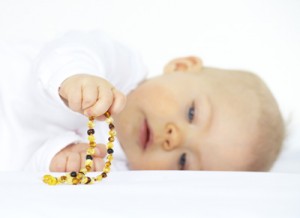What to do when your baby is Teething - and what not to do
 Personally I would not recommend Amber teething necklaces due to the possibility of your baby choking on the beads There is a lot of advice out there when it comes to teething and how best to help your baby through this potentially difficult time, but sorting out the medical advice from the old wive's tales can be tricky! We asked our resident Health Visitor, Naresh Lane, to dispel the myths and provide some clarity on the subject: Baby Teeth Babies are born with milk buds under their gums: 10 at the top, and 10 at the bottom. Most babies start teething at around 6 months, although some babies can be born with a tooth (or teeth). A child usually has a full set of teeth (20), by the age of about 3 years. Signs your baby is teething Some babies show little or no sign of teething, whilst others can become irritable, more clingy than usual, or bite or gnaw on toys, teats, or your breast. Babies are not unwell when they are teething, and do not develop a temperature. Excessive dribbling is common,
Personally I would not recommend Amber teething necklaces due to the possibility of your baby choking on the beads There is a lot of advice out there when it comes to teething and how best to help your baby through this potentially difficult time, but sorting out the medical advice from the old wive's tales can be tricky! We asked our resident Health Visitor, Naresh Lane, to dispel the myths and provide some clarity on the subject: Baby Teeth Babies are born with milk buds under their gums: 10 at the top, and 10 at the bottom. Most babies start teething at around 6 months, although some babies can be born with a tooth (or teeth). A child usually has a full set of teeth (20), by the age of about 3 years. Signs your baby is teething Some babies show little or no sign of teething, whilst others can become irritable, more clingy than usual, or bite or gnaw on toys, teats, or your breast. Babies are not unwell when they are teething, and do not develop a temperature. Excessive dribbling is common,
as are redder cheeks than usual. The gums may appear to be tender and swollen, just before a tooth erupts through the gum. Ways to ease discomfort If your baby is showing any of the signs of teething, I would recommend rubbing a clean finger on their gum as this has an instant soothing and comforting effect. Teething rings are very effective, especially those that can be cooled in a fridge. I would suggest buying a few, so that there is always one in the fridge, so you have one ready to use when needed. If your baby is over the age of 6 months, offer cucumber or melon sticks, as these are also soothing on the baby’s gums. There are a range of herbal teething powders, which are very effective for easing the pain. There have been some concerns about amber teething necklaces and bracelets for teething babies; personally I would not recommend these due to the possibility of your baby choking on the beads. Infant teething gels do provide babies with some short term pain relief, but can easily come off, as teething can lead to your baby salivating excessively. Try to keep your baby’s chin clean and dry, as saliva can irritate the chin, and it will become sore. Applying a barrier cream to your baby’s chin can help prevent this. This is important, as these sores may lead to infections. After the teeth come through You should start brushing your baby’s teeth as soon as the first tooth appears, twice a day, using a small, soft toothbrush with a small amount of children’s toothpaste. This helps the child to develop a good dental hygiene routine. You should supervise your child brushing their teeth until they are 7 years old. Rinsing after brushing is not advised – by not rinsing, you allow the toothpaste to continue to protect the teeth. Introduce a cup to your baby when they are 6 months old, aiming to be using it completely instead of a bottle by the time they are a year old; avoid non-spill cups as the suction is very difficult for babies; only offer milk or water in the cup. If you do want to offer your baby a different drink in their cup, do this at meal times, and not as a snack or drink between meals, as sugary drinks can lead to tooth decay. Breast or formula milk, or cooled, previously boiled water is recommended for babies (you don’t need to boil water after they are months old). Avoid soya-based or follow-on milk formula, as these are high in sugar and can cause tooth decay. It is important to keep the milk teeth clean and healthy to prevent infections that may affect the health of permanent teeth. The Dentist Take your baby to the dentist with you, even before they have any teeth, just to get them used to the environment. Register your baby at the dentist, and ensure that they attend a check up every 6 months – appointments are free for children, and for women for a year after having a baby. ----------------------------------------------------------------------------------------------- Naresh Lane is on the Toddle About Panel of Experts. She is the founder of Northants Health Visitor, the only Private Health Visitor service available in Northamptonshire and bordering counties. Naresh is a Registered General Nurse and Registered Health Visitor. She has worked for the NHS for nearly 30 years, with over 20 of these years as a Health Visitor. If you have any further questions please email Naresh at info@northantshealth.co.uk.